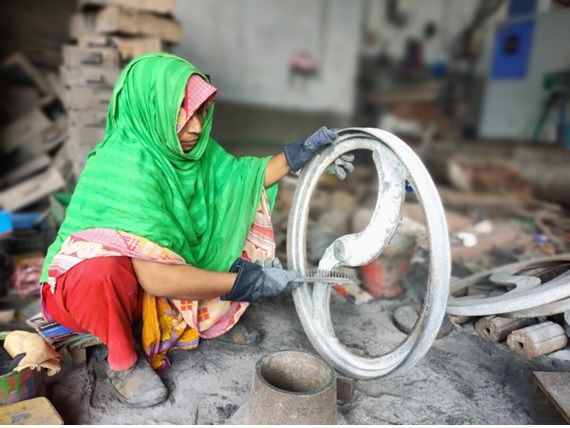Bridging the Gender Gap: Empowering Women in Agriculture through Mechanization

The agricultural light engineering sector has historically seen limited participation from women due to factors such as women’s limited technical knowledge, lack of confidence, traditional norms, workplace safety concerns, insufficient support from men peers and workshop owners, unawareness of job opportunities, perceived male dominance, and financial constraints. To bridge this gender gap in women’s access to agricultural technologies, the USAID-funded Feed the Future Cereal Systems Initiative for South Asia—Mechanization Extension Activity (CSISA-MEA), led by CIMMYT in collaboration with International Development Enterprises (iDE) and the Georgia Institute of Technology (Georgia Tech), has conducted numerous training programs in collaboration with the Bangladesh Industrial Technical Assistance Center (BITAC) over the past five years. These programs have equipped women with technical skills, enabling them to secure formal employment and enhance their livelihoods.
CSISA-MEA’s efforts include training women in machine operation, computer-aided machinery, and the agricultural machinery service sector. Significant milestones include training women in power spray painting, polishing, grinding, fettling, and drilling, which improved their employability. In Bogura, the Activity provided innovative hands-on training in basic foundry skills to women, resulting in a 20% salary increase for half of the trained women within a year. Moreover, targeted training on fodder chopper operation and maintenance, as well as rice transplanter technology, empowered women dairy farmers and service providers. The initiative also supported women entrepreneurs with resources and marketing strategies, linking them with financial institutions for loans, introducing commission-based sales models, and providing online marketing training. These efforts created a supportive ecosystem for women in agriculture and light engineering.
Additionally, the Gender Equality and Social Inclusion (GESI) study conducted by CSISA-MEA aimed to address gender integration within agriculture-based light engineering small enterprise (ABLE) enterprises. The study integrated gender sessions into workforce training, sensitizing over 1,000 members on gender discrimination, violence, and relations, promoting a GESI-friendly environment, and reinforcing CIMMYT’s commitment to equity and inclusion.
Tags: Bangladesh, mechanization, Women Farmers
